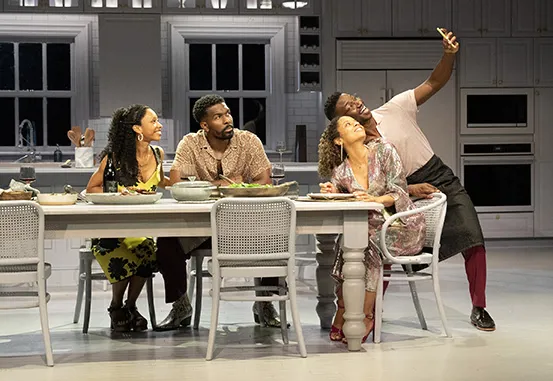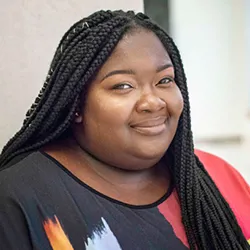GOOD BONES: A Reaffirming of Community.

BY CYNTHIA L. DORSEY
After a long week of navigating through the hustle and bustle of New York City, there’s no better way to kick off a weekend reset than by enjoying Friday night at the theater. On the evening of Friday, October 4, 2024, The Public Theater hosted its Community Night performance of GOOD BONES, written by Pulitzer Prize-winning playwright James Ijames. This wasn’t just any Community Night—it was the Black Theater Night. Martinson Hall inside The Public was filled with Black and brown faces taking up space, finding their seats, chatting, laughing, and rushing to greet friends they hadn’t seen in a while from across the room. “It’s like a family reunion up in here!” a woman exclaimed as she took a selfie with her friends. I took my usual picture of my Playbill held up in front of the stage. The stage was protected by clear poly sheeting from ceiling to floor. “Oh, they ‘bout to do a whole reconstruction on our souls with this plastic everywhere and I’m ready,” someone behind me anticipated. They weren’t wrong.
As the lights dimmed, the chatter transitioned into applause, inviting us into the story of Aisha (Susan Kelechi Watson) and Travis (Mamoudou Athie), a husband and wife who have just moved back to the neighborhood where Aisha grew up. They are in the final stages of renovating an old house they just bought. However, this renovation unveils a deeper story that confronts gentrification’s erasure of community and culture—an issue prevalent in many cities across the United States. “It’s a very American thing,” Saheem Ali, Director of GOOD BONES, shared during the post-show conversations. “This country was built on displacing people.”
Watching the show, I couldn’t help thinking about my own city, Washington, D.C. known as “The Chocolate City." This connection made sense, as GOOD BONES was commissioned by the Studio Theatre in D.C. and premiered in 2023. A highlight of Community Night was the engaging post-show conversation featuring a panel of folks who are deeply interested in the subject of gentrification and who helped the audience delve into the themes of the show. Moderated by Salamishah Tillet, journalist and Professor of Africana Studies at Rutgers University, the panel included insights from playwright James Ijames, director Saheem Ali, author and journalist Xochitl Gonzalez, and Council Members Chi Ossé and Carlina Rivera. Ijames shared during the post-show conversations, “They wanted me to write a play about gentrification. They wanted a play that was going to tackle the problems of D.C.” Ijames mentioned a couple of the problems D.C. natives have faced, like dog owners allowing their dogs to defecate on the yard while walking them on Howard University’s campus. Not too far from Howard’s campus, new residents threatened to sue owners of the Metro PCS store on 7th Street and Florida Avenue, which plays go-go music, the city’s musical heartbeat, on speakers for the block to hear. This ignited the Don’t Mute D.C. campaign rallying the community to advocate for their neighborhood.
This force of neighborhood silencing happens in the play when Travis, frustrated with the sound of music coming in from a nighttime block party, uses a neighborhood app to file a complaint with the police. “The sound of gentrification is silence,” talkback panelist, writer of The Atlantic’s “Brooklyn, Everywhere” newsletter, and New York Times bestselling author Xochitl Gonzalez analyzed about neighborhood newcomers in a recent article. “I bought this house and as a part of my luxury living experience, you should be quiet,” Gonzalez observed. Witnessing these changes firsthand in D.C. has left me concerned about what the city will look like in five years, especially after stepping away to chase my dreams in New York City. Developers are rapidly altering the structural fabric of the neighborhoods, making them nearly unrecognizable and displacing those who have lived in these homes for years away from their communities. New York City Council member Carlina Rivera discussed the painful impact of gentrification while reflecting on her childhood in the Lower East Side, which she describes as the “prototype for New York City gentrification.” She emphasized: “There are over 9,000 families that live in public housing and that question of keeping public housing while its going through this tremendous transformation and will it even continue to exist in the city, it’s a painful conversation.” In the play, we learn that Aisha has returned to the neighborhood where she was raised not only to purchase property, but also to assist her company in planning a new sports complex in the area. Throughout the story the audience also gets to know Earl (Khris Davis), a local contractor who grew up in the neighborhood and was hired to renovate the home. As Earl pulls down the clear poly sheeting one panel at a time throughout the renovations, he not only reveals his impeccable work, but also the unsettling truth about the new homeowners. Earl confronts Aisha to tell the truth to the community about the impact building the sports complex could have on their lives, pleading, “I need you to tell them the truth. That this project will change their lives. Tell them they gonna lose the ability to be a community. Tell them they’re gonna be isolated and alone. Tell them they won’t have their people anymore. Give them that dignity. Don’t let these...people use you to make it A-okay to displace hundreds of Black people. Our people.”
One might wonder what’s so wrong with Aisha’s desire for a neighborhood that is safe, has great shops, and offers a fun place for people to enjoy sports outings with friends. When I think of my neighborhood in D.C., I share the similar hope that my goddaughter can walk home safely from school, despite the abandoned homes along her route. I’d love a cozy coffee shop just a few blocks away from my childhood home where I can hide away and write. Ijames, too, has been reflecting on gentrification after writing GOOD BONES. He reflected, “I think the thing that I’m realizing now with gentrification is that it’s time for us to move toward a way of thinking about belonging that doesn’t require othering people.” And I couldn’t agree more. Community is built through a sense of togetherness that takes time. It can be loud and messy, but it’s also supportive and revitalizing. A community is nothing without the people who nurture it, and it continues to grow with new voices. As Carmen (Téa Guarino) tells Aisha in the play, “That place [referring to Dunbar Gardens, the housing project that they both grew up living in] is a part of who we are. They can see right through us. And…I think we need that. People who remember you…before you found yourself.” Both Carmen and Earl reminded me of the power of lending your voice on the issues directly effecting our communities. Council member Rivera highlighted the invaluable contributions of tenant association leaders in the community, particularly strong Black women. “When you’re talking to the tenant association leaders who are almost always strong Black women, who are leading these associations for nothing, they don’t get paid to do this work. They are the ones that are so deeply rooted and keeping the culture alive.”
Black Theater Night at The Public epitomizes the meaning of community. Theatergoers were free to laugh as loud as they wished and immerse themselves fully in the play. Even in silence, the whispered “unh unh girl” got a laugh too. These community nights give us a chance to actively challenge the data that the average theatergoer is a middle-aged white woman. For one night, we are not just spectators; we engage with a story written by us about the cities we live in and love, all while celebrating a phenomenal all-Black cast. For an hour and 45 minutes, we don’t have to feel like the “other.” We can simply be whoever we choose to be. That’s community. That’s the true power of theater.
GOOD BONES runs at The Public Theater through Sunday, October 27, 2024. Click here for more information on the show and how to get tickets.
This piece was developed with the BIPOC Critics Lab, a new program founded by Jose Solís training the next generation of BIPOC journalists. Follow on X: @BIPOCCriticsLab

Cynthia L. Dorsey is an award-winning actor, director, producer, writer, and filmmaker. She is the Co-Founder of SoulFLY Theatre Society and has devoted her artistry to liberating the stories of women of color from the page. Dorsey is also an arts educator who was nominated for an Excellence in Theatre Education Tony Award. Dorsey was a 2022/23 Prince/TTLP Fellow and currently works for P3 Productions as a Producing Fellow. Her writing has been featured in 50in50 Women Writers and on the Mortified podcast. Her freelance writings can be found on lifestyle publications MadameNoire and XoNecole. It is Dorsey’s goal as an artist to create and produce art that empowers audiences and invokes societal change.